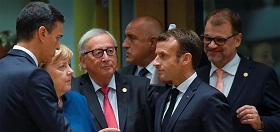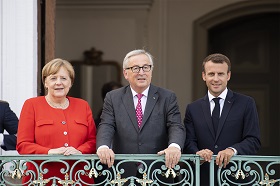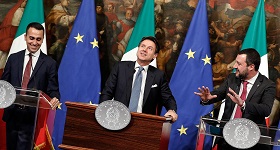The May elections to the European Parliament are fast approaching.
Emissaries of Europe’s right-wing populist parties that position themselves as Russia’s main allies are visiting Moscow with increasing regularity.
The voices of those who believe that the populist Eurosceptics are the only ones who can close the current rather unfortunate chapter in relations between Moscow and Brussels and start over are growing louder and louder.
Should the Kremlin throw in its lot with the populist Eurosceptics?
In recent decades, the European political establishment has grown lazy and flabby. It has lost its erstwhile imagination and energy and became convinced of its historical correctness and infallibility. A political shake-up could do Brussels some good. Gardeners looking after the ageing tree of European integration should not reject a new graft in the form of a populist wildling with arrogant contempt and pointed disgust. And, in my opinion, the endless repetition of the “deadly populist threat” mantra simply reflects a lack of faith in the continued vitality and historical perspectives of the “European project.”
But what I cannot understand are the hopes and fears that the state and dynamics of the relationship between Moscow and Brussels will be affected in a fundamentally positive way by a shift in the balance of power in Europe towards nationalists, left- and right-wing populists, traditionalists and other Eurosceptics. I do not understand how the “advent of populists” in the European Parliament will make it possible to turn the page in the strained relations between the two sides and start an entirely new chapter. I do not share the enthusiasm of many Russian politicians and experts about an imminent political revolution (or, should we say — counter-revolution?) in Europe.
Observing the practical steps of the supposed “pro-Russian” European populists who have come to power in their countries, one gets the impression that most of them see the issue of Russia as nothing more than a bargaining chip in a higher-stakes game with Brussels. Viktor Orbán has been joined by the leader of the Coalition of the Radical Left (Syriza) in Greece Alexis Tsipras and the shining star of the Lega Nord, Deputy Prime Minister of Italy Matteo Salvini in the repeated criticism of the sanctions against Russia, the excessive activity of NATO on its eastern borders and Brussels’ harsh rhetoric with regard to the Kremlin. As a rule, particularly loud statements were made during election campaigns or from the parliamentary seats of the political opposition.
However, once in power, these leaders invariably toe the “party line,” carefully measuring how much political recalcitrance Brussels will tolerate.
The May elections to the European Parliament are fast approaching.
Emissaries of Europe’s right-wing populist parties that position themselves as Russia’s main allies are visiting Moscow with increasing regularity.
The voices of those who believe that the populist Eurosceptics are the only ones who can close the current rather unfortunate chapter in relations between Moscow and Brussels and start over are growing louder and louder.
Should the Kremlin throw in its lot with the populist Eurosceptics?
I am deeply sceptical about this idea.
First, I would like to make two preliminary qualifications, or two disclaimers, as modern parlance prefers.
Disclaimer 1. By no means do I consider European populists “useful idiots” for Putin, nor do I see them as complete and irresponsible cynics. I have a number of close acquaintances who are staunch supporters of the National Rally in France, Lega Nord activists in Italy, People’s Party MPs in Denmark’s Folketing and other members of the unruly populist brood on the left and right wings of Europe’s political spectrum.
Of course, the motley crew of European populists has die-hard fanatics and seasoned cynics, as well as people who are simply personally unpleasant. But in my opinion, there are just as many objectionable types among Europe’s traditional conservatives, liberals and social democrats. I hate to admit it, but such specimens can sometimes be found — gasp! — in Moscow’s political circles, even in the very centre of the city. One might wonder, how do these people end up there in the first place?
Disclaimer 2. I cannot agree with those politicians and public figures from Emmanuel Macron to George Soros, who consider the rise of populism a mortal threat to the European Union. I think it is an obvious exaggeration. Moreover, Europe needs populists, both highly active right-wingers and less conspicuous left-wingers, as it needs Eurosceptics. As the saying goes, “a pike lives in the lake to keep all the fish awake.”
In recent decades, the European political establishment has grown lazy and flabby. It has lost its erstwhile imagination and energy and became convinced of its historical correctness and infallibility. A political shake-up could do Brussels some good. Gardeners looking after the ageing tree of European integration should not reject a new graft in the form of a populist wildling with arrogant contempt and pointed disgust. And, in my opinion, the endless repetition of the “deadly populist threat” mantra simply reflects a lack of faith in the continued vitality and historical perspectives of the “European project.”
But what I cannot understand are the hopes and fears that the state and dynamics of the relationship between Moscow and Brussels will be affected in a fundamentally positive way by a shift in the balance of power in Europe towards nationalists, left- and right-wing populists, traditionalists and other Eurosceptics. I do not understand how the “advent of populists” in the European Parliament will make it possible to turn the page in the strained relations between the two sides and start an entirely new chapter. I do not share the enthusiasm of many Russian politicians and experts about an imminent political revolution (or, should we say — counter-revolution?) in Europe.
This is where my doubts come from.
First of all, populist Eurosceptics and European Russophiles are not the same thing, and it is wrong to assume that they are. Take one of the pillars of the Eurosceptic offensive, Jarosław Kaczyński’s ruling Law and Justice party (PiS) in Poland, for example. Hardly anyone has reason to doubt the deep-seated hostility of the leaders of the PiS towards Belgium and the European bureaucrats who have taken root in the country. But does this dislike make Jarosław Kaczyński an ardent ally or a sympathizer of Russia, even if a latent one? Certainly not! This much is clear to anyone who follows Warsaw’s foreign policy.
Another prominent Eurosceptic leader is the Prime Minister of Hungary Viktor Orbán, who, unlike Kaczyński, actively positions himself as a proponent of developing relations with Russia and an opponent of increasing the West’s pressure on the Kremlin. However, we should not forget that for the first 20 years of his political career, Orbán was probably the most consistent, harsh and uncompromising critic of Moscow. His position changed dramatically only after meeting Vladimir Putin in person in late 2009. So, who exactly is Viktor Orbán? A sincere and unfailing friend of Russia herself or a tactical partner of a Russian leader?
Observing the practical steps of the supposed “pro-Russian” European populists who have come to power in their countries, one gets the impression that most of them see the issue of Russia as nothing more than a bargaining chip in a higher-stakes game with Brussels. Viktor Orbán has been joined by the leader of the Coalition of the Radical Left (Syriza) in Greece Alexis Tsipras and the shining star of the Lega Nord, Deputy Prime Minister of Italy Matteo Salvini in the repeated criticism of the sanctions against Russia, the excessive activity of NATO on its eastern borders and Brussels’ harsh rhetoric with regard to the Kremlin. As a rule, particularly loud statements were made during election campaigns or from the parliamentary seats of the political opposition.
However, once in power, these leaders invariably toe the “party line,” carefully measuring how much political recalcitrance Brussels will tolerate. Their readiness to support “European solidarity” on the Russian front apparently allows populists to wring additional concessions from the European Union on more important issues. This brings to mind the closing lines of Pushkin’s The Gabrieliad, where the author, making some delicate requests to the Almighty while not fully expecting a favourable response, resorts to open blackmail: “Or I’ll turn back to Satan!”
I would be extremely cautious about the assurances of those European populist crusaders who are greeted with such enthusiasm at the upper echelons of political power in Moscow. I will reiterate: many of these emissaries are decent people who are truly worried about the problems in their countries and who are no less sincere in their desire to develop cooperation between Russia and the European Union. Moreover, their determination to go against the political grain in Brussels and subject themselves to fierce and often completely unfounded attacks and even open persecution at home cannot but instil respect and sympathy.
But to take their ideas about the future of Europe literally would mean to make the same mistake that Russia’s neighbours to the west, from Kiev to London, make when they take the views of the non-mainstream opposition in Russia as the ultimate truth. The views and opinions of Eurosceptics are an important part of the overall picture. But they are only a part of it, and not necessarily the largest part.
We should also not forget about the humbling experience of the Eurosceptics, nationalists and populists from across the Atlantic. The news of Donald Trump’s election as President of the United States on November 9, 2016 was greeted with applause in the State Duma. But what has been done to improve the U.S.—Russia relations during the two years of the reign of Washington’s great nationalist and populist? We cannot blame everything on the persistent opposition of the “bad” liberal American establishment and the “deep state” to the “good” Trump. For it is the current president, and the president alone, who is responsible for many of the problems that plague U.S.—Russia relations today.
Of course, the balance of power in the European Parliament will change significantly after the May elections. Accordingly, there will be changes in the composition of the European Commission and other European institutions. It would be a big mistake on Moscow’s part to ignore these shifts, which could create new opportunities for working with Europe. For example, it is far from clear whether or not the future European Parliament will adopt the same hard-line stance on Nord Stream 2 as its current convocation. We cannot rule out the possibility that the European Parliament will take a greater interest in developing inter-parliamentary contacts with the Federal Assembly of the Russian Federation. It is entirely possible that discussions on Russia will become more meaningful and interesting. Certainly, it is worth working as closely as possible with the European Parliament, engaging with all of its factions, including the populists and Eurosceptics, which will wield a great amount of influence in the future.
Yet, throwing in its lot with the Eurosceptics and openly demonstrating the Kremlin’s preferences would be an even bigger mistake on the part of Moscow during this very intense, tangled, high-strung and somewhat unpredictable election campaign. Incidentally this would not help the Eurosceptics in any way at all: immediately, their political opponents would massively expose the “Kremlin sponsors” and throw accusations at Moscow’s alleged “Eurosceptic puppets.”
Surely, the accusations and identifications of such “sponsors” by those who make a living criticizing Russia are quite anticipated, regardless of whether Russia has actually interfered in the democratic process or not. But, at the very least, it would be nice if this time there were fewer formal grounds for such accusations and exposés than there were, say, during the election campaign in France in the spring of 2017.
Russia should also account for the fact that after the EU parliamentary elections, which are likely to be the first truly general elections in the history of the European Union, our western neighbours will enter a long and difficult period of internal restructuring. There will be a search for a new political balance, a difficult “resetting” of the old and new centres of power, a process of grinding manifestly impracticable and often contradictory pre-election promises into structural reforms, budget plans and legislative innovations. In short, everything will go the way it goes in Western democracies, only on a massively more complicated scale.
Under these conditions, it would thus be unrealistic to expect Brussels to come up with any kind of ground-breaking initiative with regard to Moscow, or indeed for any strategic shifts in the European Union’s foreign policy to take place. Even if we consider only the EU external priorities, Moscow is definitely not the only game in town: on the maps of EU headquarters in Brussels, there are also such places as London, Washington, Ankara and Beijing. Let’s face it: the European Union is pretty tired of dealing with Russia, which is perceived more as a problem rather than as an opportunity.
For Moscow, it may be more worthwhile to send cautious, delicate and carefully planned signals to the European Union, especially given the differences mounting in Brussels’ relations with Washington and Beijing. By all means, we need to think about and tailor these signals now: the window of opportunity in terms of the new European Parliament’s receptiveness to new ideas from the outside will not remain open for very long.
The populist Eurosceptics have already become an influential force on the European stage, a force that may very well continue to grow. And the EU leaders together with its international partners will have to reckon with this fact. In the meantime, we must not lose sight of the fact that it is not just the self-absorbed and self-reliant Brussels bureaucrats or the out-of-touch European elites that need a strong Europe and the success of the “European project.” Every responsible citizen of the European Union, and indeed the rest of the world — including Russia — needs a strong Europe too.
First published in French in Le Courrier de Russie.







